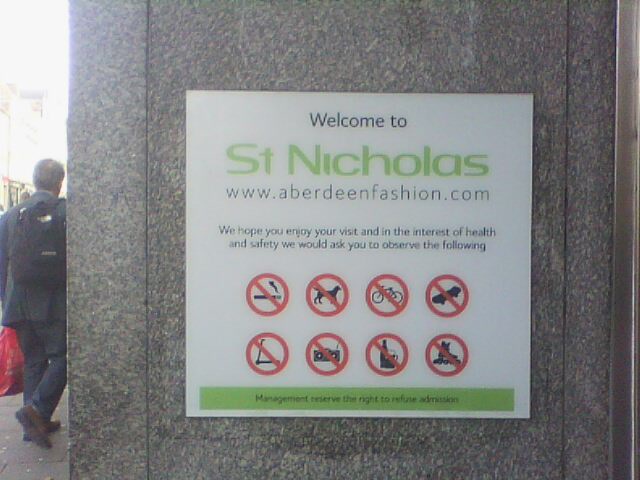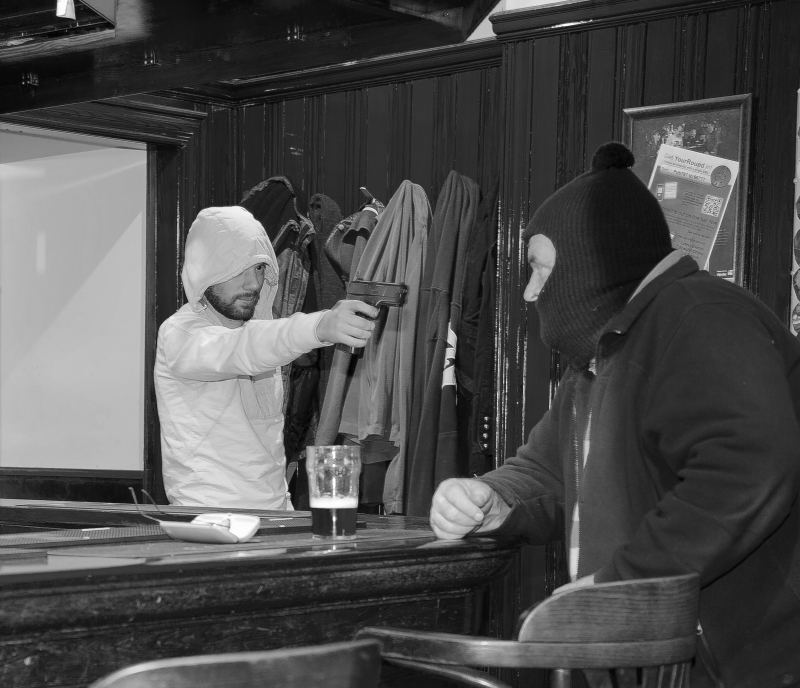Old Susannah gets to grips with Granite City Gripes such as shooting, snooping and serious tax avoidance, allegedly. By Suzanne Kelly
 It’s been a colourful week in the Granite City; referendum and Commonwealth Game Fevers have swept through town. Who can forget those beautiful Commonwealth Scottish uniforms with their pastel tartans paired with floral shirts, the Scottie dogs, and the dancing teacakes? It’s so good to see we’ve broken out from any stereotyping.
It’s been a colourful week in the Granite City; referendum and Commonwealth Game Fevers have swept through town. Who can forget those beautiful Commonwealth Scottish uniforms with their pastel tartans paired with floral shirts, the Scottie dogs, and the dancing teacakes? It’s so good to see we’ve broken out from any stereotyping.
I do wonder how the other companies which paid to have their products promoted in the games feel, knowing that Tunnock’s were approached by the organisers who wanted to use their product in a dance number? The sale of Tunnock’s cakes is apparently up by over 60%.
I wonder if the same is true for well-known Scottish sponsors Kellogg’s, Gatorade and Heineken? I think a dance number with a sixpack of beer would have added to the festivities.
The artful dolphins dotted around town are great; it’s wonderful to watch kids climb them and break off little chunks of them for souvenirs. It’s great to know people are interacting with them by vandalising and torching them, as well. For those who want to have a good look at these great sculptures, I’d get in fast.
For those of you who don’t actually want to ride a dolphin sculpture or take a chunk of one home, then be sure to see the adorable mini dolphins in the libraries; there is a trail for kids to follow, and if they visit all the dolphins, they get a goody bag. This initiative may have been modelled on similar events in other cities, but it is a good one.
The Eid celebration took place in Union Terrace Gardens; could it be the city’s organisers are mellowing a little? Despite there being tents and crowds, there weren’t scores of police, private security, crowd barriers, anti-climb paint or any of the usual high security measures the city usually pays for when someone wants to have fun. Let’s hope they tool up for the next event.
With the good things that are going on, any little issues seem to pale into insignificance. However, here are a few such little issues and some definitions.
Routine Patrol: (Modern English compound noun) – a beat or patch secured by police (formerly without guns).
Mark Williams, chief of Edinburgh’s police has put armed men on routine patrol. What could possibly go wrong? This is also what Police Scotland has done – increasingly armed its routine patrols. If the police are all now toting guns when responding to incidents, such as the recent argument in an Inverness fast food restaurant, it can only be a good thing.
The chief of police says there really aren’t that many more armed officers. He’s kindly taken it on himself to dole out the guns without bothering the nice folk in Holyrood, local government, or the citizens (heaven forbid). To give the guns out now, and deal with Holyrood later seems like a great strategy to me.
All these armed cops will probably save the taxpayer a fortune in trial costs in the long run. Perhaps it might seem to the unduly wary that when the police are dictating terms to the politicians, carrying guns where they didn’t before, searching thousands of children in on-the-spot, warrantless detentions, we are well and truly in a police state.
I’m sure you feel all the safer for it. The local Edinburgh councillors are against it, but what does that matter? They’re not the ones with the guns, so their opinion will remain just that, opinion.
Old Susannah does have one little question though: since the police and a host of authorities are spying on our computers, our phone calls and our video, wouldn’t it be better to prevent crime than to shoot people? Thankfully, the authorities say there won’t be any escalation in the criminal element getting armed as well. No, that would never happen.
Police Scotland is sending armed police to that hotbed of crime, debauchery and sin – the Belladrum festival. I’m sure all this information is comforting, but if you wish to join MP Danny Alexander, and petition the cops to lay down their arms, here is a link http://www.surveymonkey.com/s/HighlandPolicing
Actually, I have one other thought. This week (and not for the first time) American police shot the wrong man; this was in Los Angeles. It’s good to know that can’t happen here. This may be the same police force that laid siege to George Copeland’s empty flat, took him into custody days later, and tried to get him to say a pink feather duster could have been mistaken by them for a gun.
No, there will be no problems with this scheme at all.
Sure a few innocent people will be shot; Harry Stanley in London was shot when he carried an antique table leg securely wrapped in a blanket; a member of the public thought it could have been a rifle. Jean Charles da Silva e de Menezes was a Brazlian on his way to work on a tube train when he was shot several times.
Happily the police rallied round after the shooting – to tweak their stories and the records, and to spy on the bereaved family. I know I feel safer for it.
Spying on civilians? Surely that’s not going on. Well, maybe just a little, but only if there are really good reasons.
Springboard: (Modern English proper noun) company which monitors footfall and visitor movements in private and public spaces.
Inspired had an inspired idea – they’d spend £100,000 on the company Springboard to see where you and I are going in the Business Improvement District, how long we’re spending walking around, and how long we linger in shops. They say the data is all anonymous. They are also apparently holding it ‘permanently’ as per their website http://www.spring-board.info/technology
Do have a look at the technology being used – by tracing signals from your mobile / using sensors, they’ll know how long you stay in the tattoo parlour, how long you’re in the STD clinic, how long you linger in the pub, etc. etc. This is to understand your shopping patterns – anonymously of course. But with your phone number, and imagery.
Naturally you want some person knowing where you are and what you’re doing, and also being able to match that up with your credit card use in a shop if they really put their minds to it. It’s reassuring to know that such data is anonymous and will never be used other than for the purpose of monitoring your movements.
Alas, there are one or two issues. You don’t get the chance to opt out, even though various data protection agencies have grave concerns about this technology being anonymous.
Who will look at data, and will they be as saintly as the police? The police, sadly, have been in the news in the past, for the odd occasion when police officers have spied on their partners, ex-partners and so on, using surveillance info illegally. Don’t worry; it couldn’t happen in the private sector.
 There was a time when I fell afoul of this technology in Aberdeen, and it wasn’t my shopping that the security guards were monitoring.
There was a time when I fell afoul of this technology in Aberdeen, and it wasn’t my shopping that the security guards were monitoring.
Back when we had a vote on the beautiful designs proposed for Union Terrace Gardens, I went to the Academy shopping centre the day before the opening.
A colleague had told me he was harassed for trying to take photos of the exhibition space – even though he was on the very public Belmont Street.
I went to see what was up. On Belmont Street I looked in the window, took photos and took photos of the exhibition poster which was placed on Belmont Street. Well, I also went inside the Academy, and all of a sudden noticed security guards were looking at me, and coming towards me. As I’d done nothing wrong, but wanted to avoid the hassle my colleague had, I abruptly left.
I walked around for a bit, then went into the Bon Accord & St Nicholas Mall. I hadn’t been inside for more than a minute when the guard from the Academy accosted me.
The story of that little encounter is here. I contacted the Academy to protest my treatment by this guard, and to ask whether they tracked me (signs inside the mall advise that you are being tracked by your mobile; these are easy to spot if you are 8 foot tall). I never did get an answer.
I will let you know what Inspired have to say about this tracking system – and about their current financial issues (pay rises seem to have possibly been made to friends and family; this is being contested). Inspired are funded by the local businesses who incur extra costs for the bunting and spying. I wonder how a business would make up for increased costs?
Surely not by increasing prices to customers, though. Apart from the private funding, you and I gave them at least £50,000. More on that later. A spokesperson has helpfully been in touch to say they have nothing to say. We shall see.
Trust: (Eng. legal compound noun ) mechanism for ensuring a person or group’s money is used towards a specific purpose, governed by trustees.
In 2012 I was worried upon discovering The Wood Family Trust had only £29,163,000 in its treasury; it had spent £2,355,000 on an assortment of charitable acts, pensions for its personnel, and of course salary and overheads. At the time I suggested we should all pitch in.
Imagine my pleasant surprise to see that they’ve found a slightly more secure financial base – perhaps some of you did drop the odd tenner into their kitty. The trust might not be out of the woods yet, but they have a healthier £53,199,000 balance with some £5,388,000 going on charitable activities, salaries, pensions, expenses, etc.
They are still funding their competition; school children compete in groups with local charities (obviously animal charities are excluded) to work on presentations. After votes are cast, the winning charity gets the £53,000,000. Sorry – the winning charity gets around £3,000 – give or take.
Those that didn’t win the popularity contest can console themselves that they expended time and money towards trying. This teaches children a valuable lesson – winning is all-important in this winner-take-all world. No doubt you’re as much in favour of them learning this lesson as I am.
The idea may still be to get into ‘venture philanthropy’ and kindly lend some of the millions to tea-plantation owners in Rwanda, apparently in partnership of some sort with Lord Sainsbury, who might be able to find some use for the extra tea grown by those they’ve lent money to.
The fact that tens of millions have been sitting around for a year or two should in no way suggest that any form of tax evasion is going on. It’s not as if it’s a scheme whereby people are paid via an offshore tax haven so that some company or other avoids paying UK National Insurance. I’m sure I heard of some company doing this immoral scheme. If I wood have remembered the company, I’d let you know.
‘Why not just give money away to good causes?’ I can practically hear you ask. How very naive.
In venture philanthropy, you lend money out to a good cause, and get a gold star for being charitable. The people you lend the money to are in your debt, until they, er, pay their debt. This of course bears no resemblance to the medieval feudal system. The rich would allow peasants to grow food on a patch of land, and the peasant would give a share to the rich lord.
It would never happen here. Or in Rwanda. Why give money away for free if you can avoid taxes and get some of it back in due course?
Poverty and Income Inequality in Scotland: (Scottish government report) – paper claiming that there are financial imbalances within Scotland. As far-fetched as it seems, it’s just possible that some children and pensioners are living below the poverty line, while at the same time, a small minority are living with extreme wealth. No, I’ve not seen any evidence for this, either.
However, the government has this to say:-
“Poverty in Scotland has increased in 2012/13. While the rate of poverty increased for all groups, the largest increase was in the rate of child poverty.
“Relative poverty, before housing costs (BHC) in Scotland has increased to 16 per cent for the whole population, a 2 percentage point increase on the previous year. In 2012/13 there were 820,000 people living in poverty, 110,000 more than the previous year.
“Relative child poverty (BHC), increased to 19 per cent in 2012/13, up from 15 per cent the previous year. In 2012/13, there were 180,000 children living in relative poverty in Scotland, 30,000 more than in 2011/12. This reverses the trend of declining child poverty over recent years.
“Relative poverty (BHC) among working age adults in 2012/13 was 15 per cent, an increase from 13 per cent the previous year. This brings the number of working age adults in relative poverty to 480,000, an increase of 70,000 compared with 2011/12.
“Relative poverty (BHC) among pensioners in 2012/13 was 15 per cent, an increase from 14 per cent the previous year. There were 150,000 pensioners in relative poverty in 2012/13, 10,000 more than the previous year.” http://www.scotland.gov.uk/Topics/Statistics/Browse/Social-Welfare/IncomePoverty/CoreAnalysis
I must admit I have seen relative poverty; my uncle Ned is always borrowing fivers.
If only there were some way to crack down on tax avoidance, and get money to those who need it for food and shelter. Oh well, if you think of anything, do let me know.
Next Week: How the city organises its important documents (or doesn’t), and that Nice Mr Trump turns his attention back to Menie
- Comments enabled – see comments box below. Note, all comments will be moderated.
